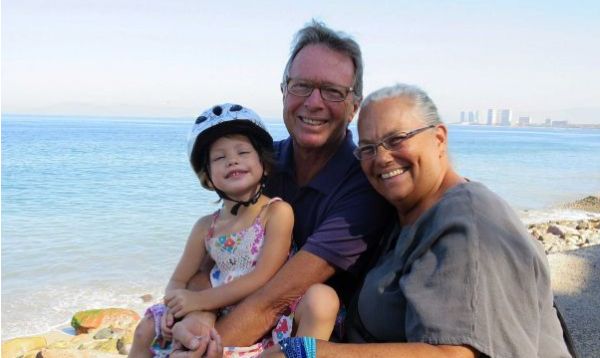Puerto Vallarta, Mexico — I was amazed one recent afternoon when I called out to my little granddaughter Elizabeth in another room and she answered, "Mande."
That's colloquial Spanish for "What can I do for you?" or simply "Yes?" But Elizabeth isn't a native Spanish speaker. Neither am I, nor is her grandmother Pam. Spanish is colonizing our household speech because we all live together most of the year in Mexico.
Pam and I began planning our retirement here more than a decade ago while we were both still working. We were going to spend winters in Puerto Vallarta and summers in a small cabin we own in the mountains of southern New Mexico.
And that's just what we're doing. But like most plans, ours had to be adjusted. We never pictured ourselves raising another child as we migrated back and forth. If we had known Elizabeth was to be part of the plan, we'd almost certainly have planned differently.
But when our daughter, her mother, gave birth four years ago and then almost immediately re-entered the hospital for a long-term disability that disqualified her for parenting, we had already bought the two homes. We had to make a fast decision, and now Elizabeth is ours by adoption.
We're far from alone. According to 2010 census data, about 5.8 million children — nearly 8 percent of U.S. children — live with grandparents identified as the head of household. Many of those children have a parent in the household, too. But an estimated 2.7 million are being raised in the absence of parents by grandparents or other close adults, an increase of 18 percent between 2000 and 2010, according to a 2012 report by the Annie E. Casey Foundation.
That means many people are remaking their retirement plans to include kids on short notice as we did, and some are bound to be doing it across borders.
While it's not the leisurely retirement we thought we wanted, in many ways it's better, starting with the pleasure of watching a beloved child grow up and, through her, participating more deeply in another culture and language.
Much of that is happening because we enrolled Elizabeth in a private Mexican preschool, La Casa Azul. The teachers and the program are terrific, the fees are affordable at about $275 monthly, the parents are mostly delightful middle-class nationals, and Elizabeth's "amigos" are adorable.
Through school events, birthday parties and day-to-day contact during drop-offs and pickups, we have friendships and a social life that seem much closer to real life than the more insular and predictable expat lifestyle we imagined.
Of course there are trade-offs. We can't travel as freely as we'd hoped. And as Elizabeth enters her academic grade levels, we'll be committed to Mexico from late August to late June. That means we'll swelter through big chunks of the hot, humid months that we'd have spent farther north if we were on our own.
Aside from school tuition, we're repeatedly reminded how expensive children are. Prices for Elizabeth's food, clothing, health care, babysitting, recreation and entertainment have all risen shockingly from what we remember from our first time around as parents. Fortunately, the shock is reduced in a country where consumer prices are lower than in the U.S. by more than 35%.
Health insurance is a problem we're still wrestling with. But the quality and availability of both pediatric and geriatric medical care in a city like Puerto Vallarta with its big expat community are excellent. There are also rich and varied cultural opportunities, though transplants from cosmopolitan Mexico City complain otherwise.
We aren't sure how long we will have the stamina or appetite for sticking to the migrant path we've chosen. One thing we underestimated is the physical and emotional effort it takes to uproot ourselves twice a year for the trip north or south to our other home.
And of course our ability to live in Mexico is subject always to the hospitality of a foreign government and the peace and security of local conditions. So far they've all been fine in our neck of the woods, but who knows?
Finally, there's the language barrier. We've lowered it considerably with Spanish lessons and daily practice. Also, in this tourist and expat mecca a majority of the Mexicans we meet speak at least some English. But it's still mentally exhausting and often humbling to get through a parent-teacher meeting or a cocktail party acting as your own real-time translator.
And speaking of humbling, there's hardly a day that goes by when we don't find ourselves relying on our 4-year-old to fill in a vocabulary gap or correct a verb tense.
On the other hand, it's hard to match the pleasure of hearing Elizabeth's sweet, familiar voice suddenly switch to another idiom when a friend comes over and merge into the perfectly accented babble that surrounds us so much of the time.
"Papa," she calls when she wants me to look at what she and her amigo are doing. "Mira!"
"Mande," I manage, and this time I feel proud.


